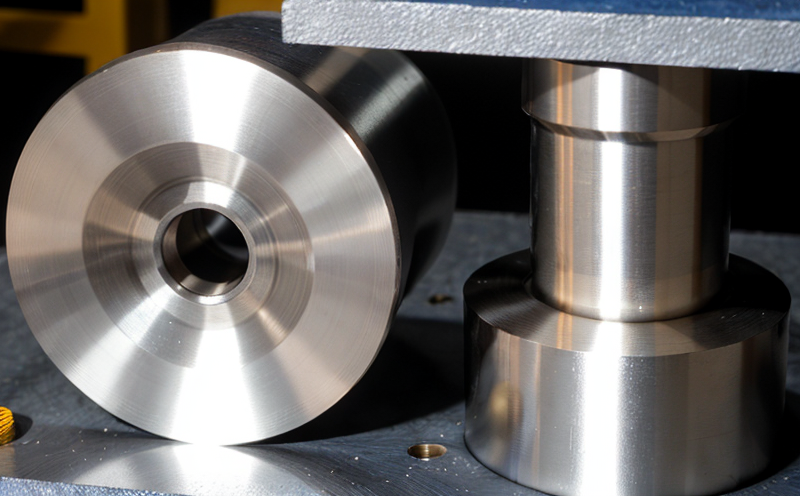ASTM E18 Rockwell Hardness of Nano Reinforced Steels
The ASTM E18 standard specifies the principles and methods for testing the hardness of metallic materials using the Rockwell hardness test. When applied to nano-reinforced steels, this method is particularly useful in evaluating the mechanical properties at a microscale level. This service focuses on quantifying the hardness of these advanced materials, which are critical in applications such as aerospace, automotive, and biomedical devices.
Testing nano-reinforced steels using ASTM E18 requires precise control over experimental conditions to ensure accurate results. The process begins with careful preparation of the sample, often involving mechanical polishing or ion milling to create a surface suitable for testing. Once prepared, the specimen is placed into the indentation machine where the Rockwell indenter (either steel ball or diamond cone) is applied under controlled load.
The hardness value is determined by measuring the depth of the indentation made in the sample's surface. The resulting depth is then converted to a Rockwell number using calibration curves derived from standard materials. Nano-reinforced steels exhibit unique properties due to their small grain sizes and dispersed nanostructures, leading to significant differences compared to conventionally produced steels.
Understanding these differences is crucial for optimizing material performance in various industries. For instance, aerospace engineers rely on this data to ensure that components like turbine blades withstand extreme conditions without failure. Similarly, automotive manufacturers use these insights to develop lighter yet stronger structures enhancing fuel efficiency and safety.
A key aspect of ASTM E18 testing lies in its ability to provide reliable comparisons between different batches or versions of nano-reinforced steel. This consistency enables quality control teams to monitor production processes closely and make necessary adjustments if deviations from expected hardness values are detected.
Moreover, the use of this standard helps align industry practices globally, ensuring uniformity across diverse geographical locations. Compliance with international standards like ASTM E18 is increasingly becoming a prerequisite for manufacturers aiming to export their products internationally or participate in competitive bidding processes.
- Environmental Impact: By improving material efficiency through enhanced hardness testing, less raw material may be required during manufacturing stages, reducing overall environmental footprint.
- Sustainability: The accurate measurement provided by ASTM E18 contributes towards developing more sustainable materials that meet stringent performance requirements without compromising on durability or longevity.
In summary, ASTM E18 provides a robust framework for assessing the hardness of nano-reinforced steels, playing an essential role in advancing technology across multiple sectors. Its application ensures not only better product quality but also contributes positively towards environmental sustainability goals.
Industry Applications
The ASTM E18 Rockwell Hardness test for nano-reinforced steels finds extensive application across various industries where high-performance materials are paramount. One of the primary beneficiaries is the aerospace industry, which demands lightweight yet robust structures capable of withstanding harsh environments. By accurately measuring hardness using this method, engineers can select appropriate alloys that meet both strength and weight criteria necessary for aircraft components such as landing gear or engine parts.
In automotive manufacturing, nano-reinforced steels play a crucial role in enhancing vehicle safety while improving fuel efficiency. The precise hardness values obtained via ASTM E18 help ensure consistent quality throughout the production process, thereby reducing defects and increasing overall reliability. This is especially important given today's stringent regulatory requirements regarding emissions standards.
Biomedical device manufacturers also leverage this testing technique to develop safer implants that integrate seamlessly with human tissue without causing adverse reactions. The high precision offered by ASTM E18 allows for tailoring the mechanical properties of these devices specifically to individual patient needs, thus optimizing both functionality and biocompatibility.
Additionally, in construction materials science, understanding the hardness characteristics of nano-reinforced steels aids in designing more durable infrastructure that can withstand natural disasters or other extreme weather conditions. This knowledge supports sustainable building practices aimed at reducing long-term maintenance costs while enhancing structural integrity.
The versatility of ASTM E18 makes it indispensable for any organization involved with developing advanced materials for demanding applications. Its ability to deliver consistent, accurate results across diverse environments ensures that manufacturers can confidently meet client expectations and regulatory requirements alike.
International Acceptance and Recognition
The ASTM E18 Rockwell Hardness test for nano-reinforced steels enjoys widespread international acceptance due to its stringent quality control measures and consistent results. This standard has been recognized by numerous organizations around the world, including but not limited to ASME (American Society of Mechanical Engineers), ISO (International Organization for Standardization), and IEC (International Electrotechnical Commission).
A number of countries have adopted ASTM E18 as part of their national standards or guidelines. For example, in Europe, EN 356:2008 explicitly mentions the use of Rockwell hardness testing methods similar to those described in ASTM E18 for evaluating metallic materials. Similarly, China's GB/T 4342-2017 incorporates principles from ASTM E18 when specifying how to perform hardness tests on metal products.
Many universities and research institutions worldwide utilize ASTM E18 as a benchmark against which they validate their own findings during academic studies or experimental work related to nano-reinforced steels. This ensures that all parties involved are working with the same set of parameters, thereby facilitating collaboration and knowledge sharing among stakeholders.
The global acceptance of ASTM E18 is further bolstered by its compatibility with other international standards such as ISO 6507 and IEC 62439-2. These additional references reinforce the reliability and applicability of the test across different sectors, making it a preferred choice for organizations seeking to establish consistent quality assurance processes.
Overall, the widespread adoption and recognition of ASTM E18 demonstrate its value as an industry-wide standard that promotes uniformity in hardness testing practices globally. This consistency fosters greater trust between suppliers and buyers alike, ensuring that products meet specified performance levels regardless of where they are manufactured or sold.





